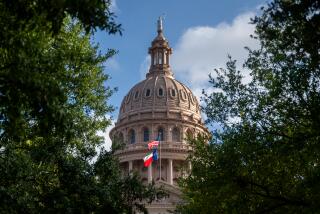Williams Sweeps GOP Vote in Texas Primary : Politics: Richards and Mattox run nearly even among the Democrats in the race for governor. They will be meeting in a runoff in April.
- Share via
AUSTIN, Tex. — Clayton W. Williams, a free-wheeling success in the business world and a fast learner in the political realm, won the Texas Republican gubernatorial nomination Tuesday.
In the Democratic gubernatorial primary, state Treasurer Ann Richards and Atty. Gen. Jim Mattox made it into a runoff on April 10. Former governor Mark White, who finished third in the Democratic balloting, conceded defeat about three hours after the polls closed.
Williams’ campaign, which promoted his folksy Texas style and his background in ranching, oil, gas, banking and telecommunications ventures, overwhelmed his initially better known Republican rivals--railroad commissioner and ex-Democrat Kent Hance, former Secretary of State Jack Rains, and Dallas lawyer Tom Luce.
With 70% of GOP precincts counted, Williams had 379,197 votes or 62%; Hance had 94,642 votes or 15%; Luce had 75,530 votes or 12%, and Rains had 59,833 votes or 10%.
On the Democratic side, with 76% of precincts counted, Richards had 422,976 votes or 39%; Mattox had 403,111 votes or 37%, and White had 214,753 votes or 20%. Four other candidates divided the remaining vote.
The size of Williams’ victory margin in this first contest of the 1990 political season appeared to give Republicans an early advantage in the general election against the Democrats. That race takes on national implications because the party winning the governorship will get extra leverage in determining how the state’s congressional seats will be reapportioned after the 1990 census. Texas, already the third-most populous state, is expected to gain three or four more House seats as a result of the census.
Even before the polls closed, Williams was confidently gearing up for the long struggle against whoever the Democratic nominee turns out to be.
“I expect to get real solid Democratic support,” he told reporters when he arrived here Tuesday afternoon at the close of a three-day, 16-city tour that concluded his campaign. “That old rural conservative Democrat is a good target for a man who has worked with his hands like I have,” the self-made millionaire added.
Adding to Republican optimism and Democratic anxiety about the November election is that Williams will be teamed at the top of the GOP ticket with Republican Sen. Phil Gramm, an enormously potent vote getter who was renominated Tuesday without opposition.
Gramm, who took 59% of the vote in his 1984 election, is expected to have an even easier time of it in 1990 against his Democratic challenger, the little known state Sen. Hugh Parmer.
“A Gramm-Williams combo at the top of the ticket is the deadliest thing the Republicans could put against us,” said George Christian, former press secretary to President Lyndon B. Johnson and now a Texas political consultant.
On the Democratic side, Richards’ strong showing suggested that the political trump card her advisers had counted on--the women’s vote--had not failed her. They noted that women customarily make up nearly 55% of the vote in Democratic primaries and expected Richards to get better than 60% of that total, giving her a base of about 35% of the overall primary vote.
The primary campaign was waged against the backdrop of a state still struggling to regain its economic footing after the energy bust of the late 1980s.
Even as Tuesday’s balloting took place, the Legislature was in the midst of a special session dealing with the state Supreme Court’s ruling that the financing arrangement for the public schools was unconstitutional. The system is now based on property tax, which means that funding varies wildly from district to district.
It was estimated that the treasury would have to find billions of dollars to comply with the court’s dictum on schools and with another court finding of overcrowding in the state prison system.
Despite these problems, all the gubernatorial candidates in both parties joined in voicing their opposition to any new revenue raising measures.
More to Read
Get the L.A. Times Politics newsletter
Deeply reported insights into legislation, politics and policy from Sacramento, Washington and beyond. In your inbox twice per week.
You may occasionally receive promotional content from the Los Angeles Times.










